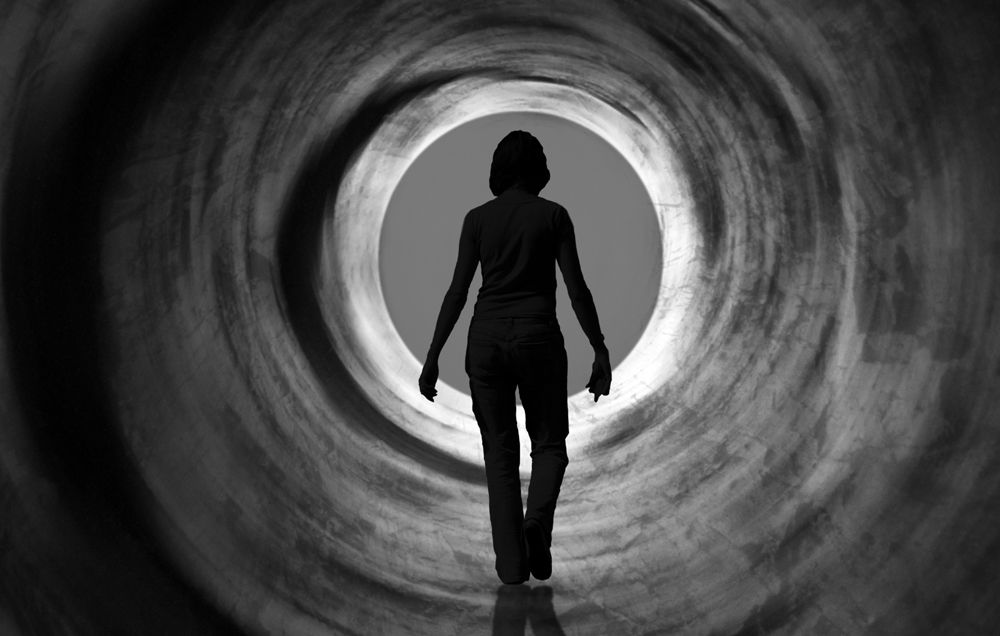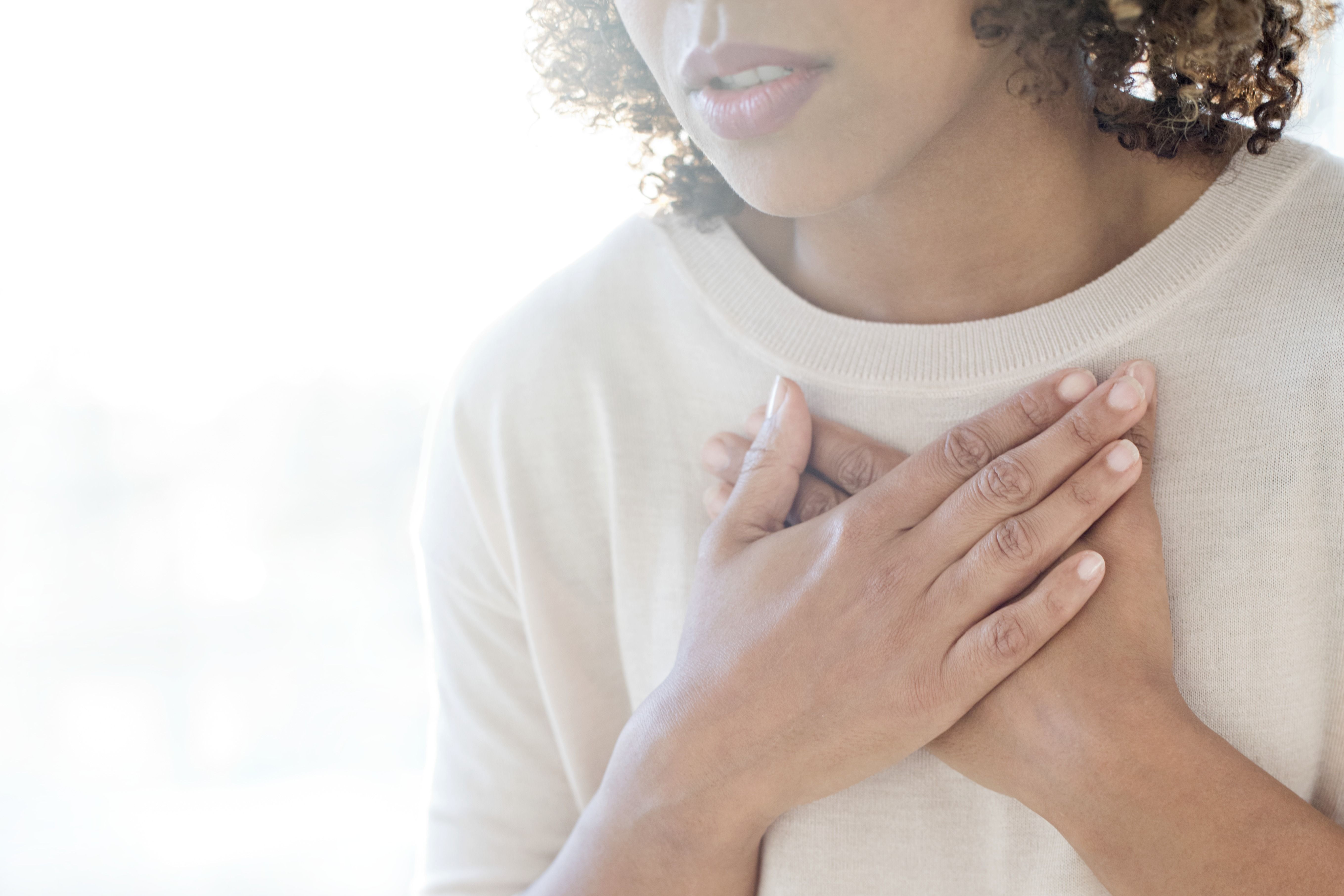Hey, Nickelodeon! Guess what? I am, in fact, afraid of the dark. (Great show, btw.) Oh, and I am 26 years old.
Go ahead and laugh because that is kind of hilarious, I’m aware. Even funnier? Watching a full-grown adult woman flee her parents’ basement in a state of panic…or screech like I’m the star of a horror movie the minute anyone shuts off the lights without a heads up…or shove past her BF to ensure she’s the first one free out the soon-to-be-dark apartment.
This unraveling of fear happens to me almost every single time I’m in the dark, albeit at different intensities. In addition to bugging out in a dark room at home, work, wherever, I also feel extremely uncomfortable and on edge even walking my dog walking a block to the bodega (for candy, duh) at night in a very lit city.
Heck, I also chose my undergraduate university because it was well lit (okay, among maaaaany other pros of course). But point being: The school seemed impressively illuminated so that I could see my surroundings during late walks from the library, which in turn kept my imagination from escalating…as much.
I know that all of my anxiety-boosting, heart-pounding responses to the dark are irrational.
There aren’t any monsters in my closet, boogie men under my bed, or creepers camped out in dimly lit corners. Yet, I can’t help but let it freak me the eff out.
Part of my thinking is very logical. Nothing good can happen when you can’t see clearly or at all.But I’ve also spent ample time in a therapist’s chair and psychoanalyzing myself, and I’ve come to the conclusion that at least one other valid reason for my fear of the dark has to do with not feeling in control.

When I can’t see while moving from room to room because I am trapped in the dark, I feel like I’ve lost control of my surroundings and the situation feels out of my hands. There’s no ability for me to achieve clarity (not even my progressive eyeglasses can help in this case) and restore my sight. At least, it feels that way.
Sure, I could technically do a dance of feeling around for edges of the environment until I reach the light switch or doorway—but the dark is also paralyzing when you are thiiiis frightened.
I’ve wondered: Shouldn’t you grow out of a fear of the dark by the time you’re an adult? Yes…but also no.
Many children do simply outgrow their fear of the dark. “With active imaginations and deep needs for security, children can experience darkness as a primitive threat to their safety,” says Alicia H. Clark, PsyD, a clinical psychologist and author of Hack Your Anxiety. “Typically these fears abate as children grow and recognize through their experience that they are safe in the dark.” Ugh, lucky them.

But really, a fear of the dark has no age, and this is especially the case if the phobia was never treated as a kiddo, says Terri Bacow, PhD, a clinical psychologist in New York City. An untreated phobia can persist through adulthood thanks to a little something called avoidance. The more you stay away from a feared object or situation, such as refusing to go to the black basement at all costs, the more likely you are to maintain this phobia.
“Essentially, you never have the opportunity to learn that you can be in the dark, and you will be okay,” Bacow explains. Also potentially at fault for an ongoing fear like this? A traumatic experience as an adult that either led to or made you revisit a particular fear, such as getting trapped in a dark elevator for hours.
If you’re still freaked out by the dark, too, join to the club…and buy a nightlight (or three).
At this point in my career at Women’s Health, I’ve shared everything from my germaphobe neuroses (no shoes indoors, plz) to my challenges with depression with the world wide web, so it’s safe to say I have no shame in admitting that I use many nightlights. While the OG Winnie the Pooh number I relied on as a child is unfortunately long gone, I’m in a pretty committed relationship with the basic motion-sensor options from Amazon.
While being able to see that you are safe can make it easier to believe that you are IRL, using a nightlight is just a starting place, Clark notes. The real phobia-shattering results come from taking on bigger challenges, such as gradually reducing the hours you sleep with a nightlight or, even more effective for intense phobias, per Bacow, doing self-exposure-therapy in which you spend more and more time in the dark until you habituate or get used to it entirely.
Also helpful? Ask yourself what you’re afraid of and what you think is going to happen in the dark. Then, try to identify any actual evidence such as stats that support or (even better!) contradict your fears, Bacow explains.
If your fear is more about, say, your safety, then Clark recommends using this anxiety to your advantage. “Strengthen your locks or install a security system to make sure you are safe. Rationally knowing you are safe can counteracts irrational fears and is how you cultivate feelings of safety.”
Meanwhile, at Chez Bacharach, I have a nightlight in every room to ease me through any midnight movement, triple lock my door every eve, and frequently meditate before bed to calm down. But I’ll be honest, I do still count on my Phoebe Buffay-esque run to get up the stairs f.a.s.t. when darkness falls.
Source: Read Full Article
